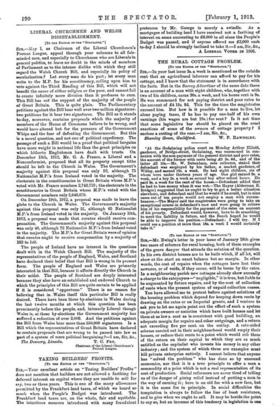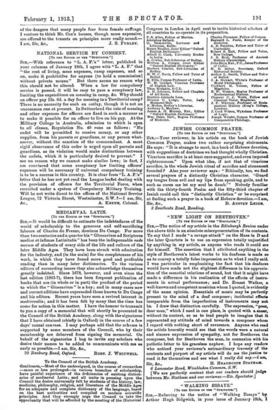(To THE EDTIOR OF THE "SPECIATOII.n Sin,—Mr. Ewing's letter in
your issue of January 18th gives two cases of schemes for rural housing, both of them examples of the grave danger that attends the solution of the question. In his own district houses are to be built which, if all let, will show at the start an exact balance but no margin. In other words, the cost of repairs when the cottages have lost their newness, or of voids, if they occur, will be borne by the rates. In a neighbouring parish new cottages already show annually a charge to the ratepayers—" negligible," it is true, but liable to be augmented by future repairs, and by the cost of collection of rents when the present system of unpaid collection ceases.
You have allowed me to protest before against solutions of the housing problem which depend for keeping down rents by drawing on the rates or on Imperial grants, and I venture to ask you to let me again point out the effect of such a system on private owners or societies which have built houses and let them at as low a cost as is consistent with good building, an adequate margin for repairs and other outgoings, and a return not exceeding five per cent. on the outlay. A rate-aided scheme carried out in their neighbourhood would empty their houses, or reduce their rents to a point which would rob them of the return on their capital to which they are as much entitled as the capitalist who invests his money in any other industry ; and the system of which these are examples must kill private enterprise entirely. I cannot believe that anyone has " solved the problem " who has done so by unsound economics, nor that it is a true principle to offer a man a commodity at a price which is not a real representation of its cost of production. Social reformers are never tired of telling us of the danger of giving relief instead of putting a man in the way of earning it ; here is an old foe with a new face, but it is the same foe in principle. In social difficulties the temptation is always to follow the line of least resistance, and to give when we ought to sell. It may be beside the point to say so, but an increase of this tendency in legislation is one
of the dangers that many people fear from female suffrage.
I venture to think Mr. Cox's houses, though more expensive, are offered to the tenants on principles more really sound.—











































 Previous page
Previous page